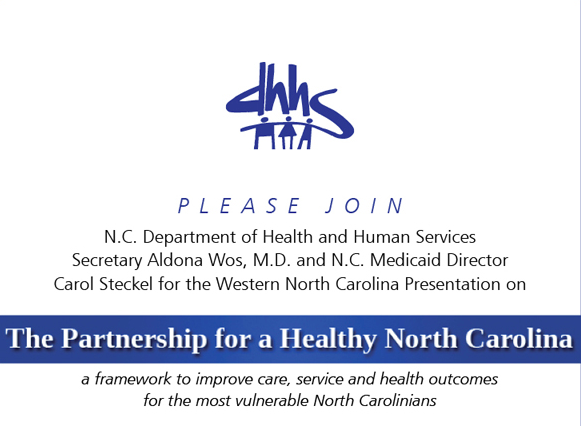
As part of an ongoing effort to speak with North Carolinians about Gov. Pat McCrory’s proposed changes to the way the state’s Medicaid program operates, N.C. Department of Health and Human Services Secretary Dr. Aldona Wos and N.C. Medicaid Director Carol Steckel will give a presentation about the plan in Asheville on Monday, April 22. This presentation is intended for the provider community, and will be held at 11:30 a.m. at MAHEC Education Center at 121 Hendersonville Road.
The plan proposed by the governor on April 3, called Partnership for a Healthy North Carolina, would privatize most of the state’s Medicaid program by having 3-4 comprehensive care entities handle physical, mental and substance abuse for the low-income and disabled people who use the health care system. For patients, there would be no eligibility requirement changes to Medicaid, but health care providers would operate on a per-member-per-month payment model, meaning providers are given a set amount of money to spend per patient.
Recently, WRAL conducted an extensive interview with Wos and Steckel about the Medicaid overhaul. It can be watched in full here.
On April 12, Western Carolina Medical Society, a local physicians advocacy group, sent a letter to Gov. McCrory, Wos, N.C. Speaker of the House Thom Tillis and N.C. President Pro Tempore Sen.Phil Berger about the governor’s recent proposal to allow private and public companies to manage the state’s Medicaid program. The letter can be found in full below as well as on the WCMS website:
April 12, 2013
Governor Pat McCrory Office of the Governor 20301 Mail Service Center Raleigh, NC 27699-0301Dear Governor McCrory,
On behalf of the 930+ physicians of the Western Carolina Medical Society (WCMS), covering 16 counties in Western North Carolina, we want to share our perspective on your recent proposal to reform our state’s Medicaid program.
We are keenly aware of the financial difficulties we face in North Carolina. We understand the significant impact Medicaid has on the state budget and can appreciate the advantage of having a known year-to-year cost for Medicaid. In addition, we support the continuing need for reform to the current structure. However, we believe that this proposal requires more study to determine how it addresses these needs and what the impact might be on Medicaid recipients.
As physicians on the front line of patient care, we daily witness the challenge of providing all the care our patients need within a cost structure we all can afford. This is nowhere more evident than in the care of our Medicaid patients. We know from personal experience that focusing predominately on containing cost results in the erosion of health care quality and access to care. At the same time, we acknowledge that focusing only on health care quality and access places us on an unsustainable financial trajectory. There must be a balance between cost and quality/access to achieve a system we can live with.
The history of health care is full of ‘bold’ examples that did not pan out as anticipated, such as devices that didn’t work, medications that had to be recalled after being introduced, and new treatment strategies that held great promise in early studies, but didn’t hold up over time. In each example above, what we failed to do was to demonstrate that the ‘new’ idea was actually better than what we already had.Certainly our experience in North Carolina with Mental Health reform demonstrates this all too well. The current disarray in mental health services started in the late 1980s with the influx of managed care organizations. It has continued with the privatization of services in place of the community mental health clinics and has not achieved the results its proponents were seeking.
Where is the compelling evidence that managed care companies are more capable than our current system to effectively balance cost containment with the quality, delivery, and access issues that are so difficult with the Medicaid population here in North Carolina? If these organizations do not accurately forecast what health needs will cost, their profitability will be at risk. The response seen time and again is to deny services and create obstacles to care for providers, placing already vulnerable patients at risk. We must tread carefully thinking about health care as a ‘free enterprise’ entity; there is a broader array of risks and potential benefits to society than just the benefit of cost forecasting and accounting.
Our direct experience with CCNC demonstrates they possess a sophisticated understanding of who their clients are and the challenges that must be met to serve them in a fiscally responsible way. CCNC is nationally recognized and gives us a solid, evidence-based foundation for improving both fiscal health and patient health.
Rather than replace what we have, should we not first see if CCNC can be improved to better respond to quality, delivery and cost challenges? What does the current system need to achieve that it is not able to do now? What is keeping it from achieving this? What does CCNC need to learn to be better at and is it capable of making these improvements? We must be innovative and invest in caring for our citizens. We must address these complex problems in new ways. Can we build on the kind of sophisticated infrastructure CCNC
has put in place to save health care dollars? WCMS is committed to helping CCNC answer the questions posed above and continue toward the vision of these improved systems of care. If the current system does not have the capability to respond effectively, then by all means, we should move to a new model, but one that can demonstrate its ability to meet all the challenges.

Treatment decisions in medicine are about balancing the chance for benefit against the risk of harm. The current proposal appears to address some of the potential benefit, but little of the risk for harm. Accurately and appropriately estimating this balance is the challenge of effective decision making and will require the collaboration of government, health care stakeholders and patients. We hope to work with you to openly and transparently study, understand, and publish the perspectives of all the stakeholders.Like the North Carolina Medical Society, WCMS is committed to working with you and the legislature to ensure that any reforms implemented best balance our responsibility for care with our fiscal realities.
Sincerely,
Frank Moretz, MD
President, Western Carolina Medical SocietyMiriam Schwarz
CEO, Western Carolina Medical SocietyC: Aldona Wos, Secretary of DHHS
Representative Thom Tillis, Speaker of the House Senator Phil Berger, President Pro Tempore




Ms. Byrd,
Thank you so much for covering this and for including the response from the Western Carolina Medical Society. Between Medicaid Privatization, the refusal of the Medicaid Expansion, the cancellation of the Western Highland’s MCO contract, the governor and the state legislature are making monumental decisions about health care delivery without much in the way of study, deliberation, or public comment. Thank you for shining some light on this very important subject.
Sincerely,
Terry Van Duyn